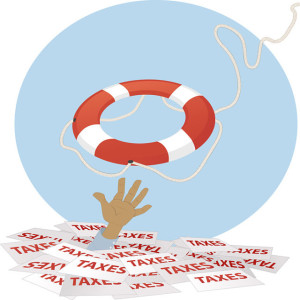Should you file the tax return if you can’t pay the tax?
You got to the bottom of your tax return and the amount you owe is bigger than your checkbook balance.
- Scared of filing the return for fear of immediate collection action?
- Scared of even calculating how much you owe? think an extension of time to file looks good?
- Fearful that you’ll be hanging a sign around your neck: squeeze this guy?
Nope. It doesn’t work that way.
The IRS does not start harassing nonpayers for money immediately after a return is filed. Or even months afterward. They haven’t even posted the returns that have been filed by then.
Relax, breathe deeply, and file the return.
There are far more advantages to getting the return on file than risks in admitting you owe money you can’t pay.
Easy tax payment plans available
If you can’t pay the full amount of the tax owed, send a partial payment with your return. Reduce your debt to the tax folks as much as you can.
Nothing requires that you enter into an installment agreement for payment. Simply send money regularly toward retiring the tax.
Put your name, social security number and the tax year you want the money credited to on the check.
If you feel the need for a formal payment agreement with the feds, you can set up a payment plan, online, if you owe less than $50,000.
Separate penalties for failure to file
If you fail to file a tax return and don’t get an extension, you expose yourself to a separate penalty for failure to file the return.
That’s on top of the penalty for failure to pay as required.
So, it’s expensive to try to drop out of sight.
Filing returns start clock ticking on escape options
Taxes don’t live forever.
There’s a collection statute of limitations that makes taxes uncollectable. Bankruptcy laws permit the discharge of taxes of a certain age long before they expire of old age.
But both escape routes for delinquent taxes start counting from the filing of your tax return. (More precisely, the statute of limitations starts from assessment, but filing the return is a self assessment).
Last year’s figures drive this year’s withholding
The most important reason to prepare last year’s tax return now is to get your withholding right for the current year.
Extensions to file are seductive, but dangerous. It delays adjusting your withholding long into the current tax year to match your actual tax liability. You don’t want to be in the hole again, do you?,
If you put off calculating just how much you owe for last year til October, you have only a few months before next April to get this year’s taxes paid in.
Closing your eyes to an underwithholding problem won’t make it go away.
Calculate what you owe, make a plan to pay it if possible, and fix your withholding or quarterly payments so you’re OK next year.
More
Your right to a refund has an expiration date
Tackling tax liens in Chapter 13
Stop making quarterly tax payments






